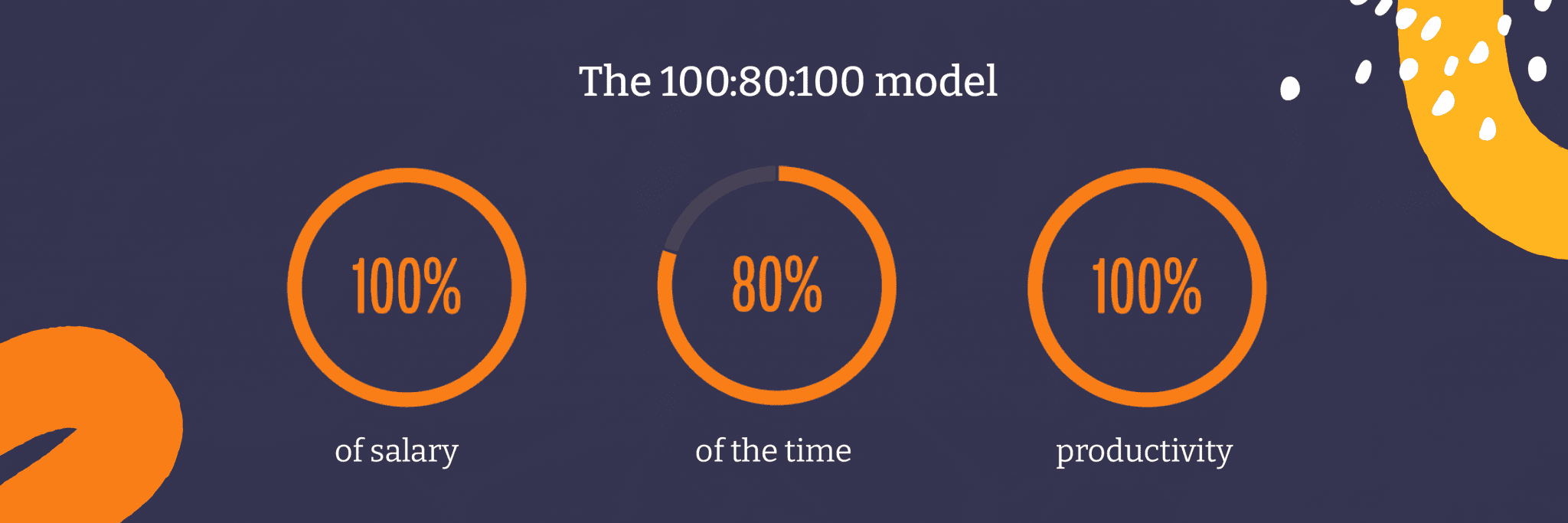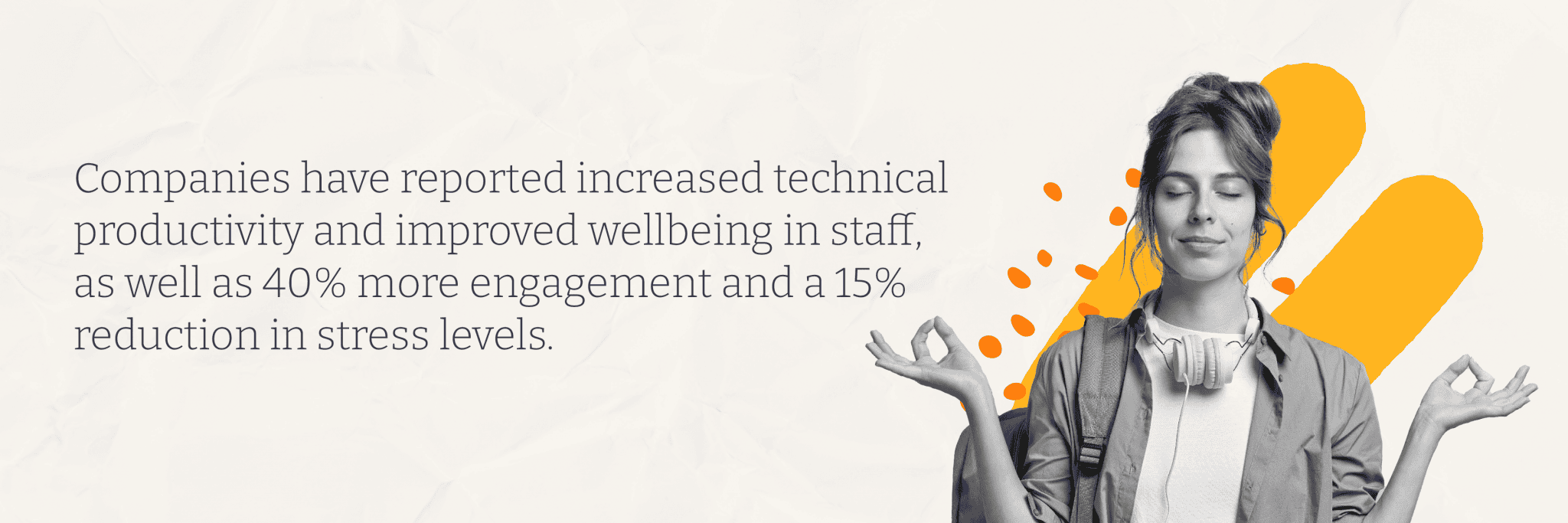Four-Day Week: The Future of Work or Just a Fad?

Gillian French
Employee Experience Officer
26 Jul 2022

Given its positive impact on productivity and staff retention, companies should be seriously considering making the leap to a four-day week.
We have rethought where we work. Why can’t we start changing the hours we work too? The four-day week is already doing wonders for lots of companies, and yet many are wary of giving it a go.
It’s not just a trend that can help you achieve better recruitment and retention rates, though its impacts in these areas are well documented. According to research carried out by 4 Day Week Global, 63% of businesses find it easier to attract and keep quality staff with a four-day working week. It’s also a great way to challenge the 21st century’s always-on culture that’s burning people out like never before.
Indeed found that employee burnout is on the rise: in March 2021, 52% of all workers were feeling burned out, up 9% from a pre-pandemic survey. Employees of all ages and types are continuing to face stress, fatigue, and challenges to their mental health, causing record numbers of them to resign.
The four-day week can help solve many of these issues facing organizations today, and more: record-high resignations, absenteeism, threats to employee health and wellbeing, work-life balance, and diversity and inclusion.

Just last month, over 3,000 workers at 70 UK companies began trialling a four-day week in the 100:80:100 model – 100% of salary for 80% of the time, in exchange for a commitment to maintaining 100% productivity. And here in Ireland, 85% of employees are in favour of a four-day week.
With all of this in mind, I view the four-day week as something every workplace should strongly consider.
Champions of the four-day week
One of the biggest supporters of the four-day week is Andrew Barnes. He implemented a four-day week at his New Zealand estate-planning company Guardian Perpetual and inspired by its success, went on to write a book about the positive impacts of a shorter working week on productivity, profitability, and wellbeing.
Barnes’ story has been making headlines around the world ever since. He’s now the architect of six-month coordinated trials of the four-day week for more than 150 companies employing over 7,000 people across the US, the UK, Ireland, Australia, and New Zealand.
He says: “The gig economy, in its current form, is fiscally corrosive and destabilizing to society. The good news is that replacing it will take only some shared political and corporate will, with no one having to carry the can on their own. The four-day week offers a clear way forward.”
It shouldn’t be seen as a controversial move when so many companies have already tried it and experienced no change in productivity. In fact, many have reported increased technical productivity and improved wellbeing in staff, as well as 40% more engagement and a 15% reduction in stress levels.

Four-day week trials have also been carried out in Belgium, Iceland and New Zealand. Belgian employees now have the right to choose to work a full week in four days and in Iceland, the trial saw employee health and work-life balance improve.
Debunking the myths
There are a few myths about the four-day week that we need to move past. Here are three I particularly want to challenge.

1. Less work will get done
It’s well documented that the hours you work don’t always dictate the quality of your results. As Andrew Barnes said, “There is no credible evidence to suggest the more you work, the more productive, creative and efficient you become – in fact, the opposite is true.”
It’s clear to me that working longer isn’t about working smarter; we need to focus on value instead of hours put in.
2. Everyone has to be off on a Friday
You can be flexible with your four-day week and implement it in your own way. If you need to have your business open five days a week, have some employees do Monday to Thursday shifts and others can cover Tuesday to Friday.
Organizing this doesn’t have to land on leadership either. In fact, empowering employees to work out schedules for themselves means they can coordinate with one another on their preferences. It also instills a sense of trust in the company.
The team will know better what they can and can’t manage and with the common purpose of an extra day off for everyone, I’m sure they’ll reach the right outcome.
3. Employees won’t be as motivated or ambitious
We need to forget the idea that only people who want to work as many hours in a day as possible are career-driven and ambitious. Many of us care about the work we do but also about the other aspects of our lives.
Speaking about the always-on culture we find ourselves in, Barnes has said: “Workaholics have always roamed among us but a compulsion to work was previously understood as a choice or, at worst, the product of a specific company’s culture, not the manifestation of a larger cultural mandate.”
If we’re to overcome this culture, adopting a four-day week is a step in the right direction.
The benefits for business and society
Healthy and happy employees are the heart and soul of a business, and more flexible work schedules can go a long way towards their wellbeing.
In her book Beyond Measure, entrepreneur, CEO and keynote speaker Margaret Heffernan writes: “Working 11 hours or more a day had at least doubled the risk of depression. Those working 55 hours a week or more began, in midlife, to suffer cognitive loss.”
When Andrew Barnes first trialled the four-day week in his company, employees’ stress levels dropped by 7%. When Microsoft Japan switched to a four-day week, productivity levels grew by 40%. But it’s not just a company’s bottom line that can benefit – shorter work weeks positively impact wider society too.

If everyone worked one day less, that would translate to fewer cars on the road, reducing the size of our carbon footprint. Giving parents more time to be truly present with their children would benefit the next generation. And with more time for exercise, food planning, and quality time with friends and family, our collective mental health is bound to reap the benefits.
Making the four-day week work for everyone
Of course, we can’t assume that achieving a four-day week will be smooth sailing for every organization. It’s important to have the right foundation before diving right in, such as a culture that prioritizes compassion, open communication, and honesty.
As with many workplace changes, those in more senior positions should lead by example. Leaders who themselves have a very unhealthy work-life balance or have no other interests outside the office will struggle to adapt to the four-day week. Organizations that are either under-resourced, inefficient, or have an ineffective leadership team will find it challenging to move to a four-day week.
We can’t assume that a four-day week will simply solve deeper business and cultural issues. But if we approach this new dynamic with realistic expectations and clear objectives, we’ll see a big difference. With that in mind, some of the key ingredients for a successful shift to the four-day week include:
- Keep productivity and momentum of a five-day week
- Cut out least productive activities
- Reduce frequency of meetings in general
- Less time for non-work distractions like social media
- Constant communication on implementation progress
- Clear objectives communicated by leadership
- Everyone takes part – even leaders
About time…
If you ask anyone – and I would set this as a challenge for our readers – whether or not they believe their organization is 100% effective, most honest people will tell you that there is wastage. In the US, companies lose an average of $1.7 million each year for every 100 employees because of wasted time.
We have really become obsessed with time – but probably in the wrong way. I believe that as employees and human beings, we should value our own time and what we are doing with it. But organizations also need to be mindful of people’s time and how precious it is instead of taking it for granted.
As Margaret Heffernan puts it: “Time is our most precious asset – once spent we can never retrieve it. So deciding how to spend it is powerful.”

So that…
I don’t think it’s a stretch to say that shifting to a four-day week can change people’s lives for the better. The greater flexibility at work and extra personal time mean employees can bring their best selves to both parts of their lives.
And when employees are treated with trust and respect, they bring those same values to their work. As soon as we start to believe that working every minute of nine to five from Monday to Friday is the only way to see results, we’ve already become some of the biggest obstacles to our own productivity.
I have personally worked a four-day week in the past and I know that I was at my most efficient and effective during that time. My family benefited from having the bandwidth to prepare healthier food and spend more quality time together.
And at work, I wanted to make sure I didn’t let the team down; that I delivered on all my projects so it couldn’t be said that the four-day week was an issue. As the only woman on the senior leadership team at the time, however, I felt that made things harder. That’s why I think everyone in an organization needs to work a four-day week instead of a select few. It evens the playing field and can make our workplaces more diverse and inclusive.
I was speaking to David Ulrich recently and he made a great point that with everything we propose at work, especially when it comes to HR initiatives, we should highlight the potential impact. He contextualizes his proposals by always including the phrase “…so that…”.
Taking inspiration from this, I believe organizations should embrace the four-day week so that their employees are happier and more engaged, resulting in lower absenteeism, attrition, and operating costs.
Ultimately, this will positively affect the bottom line. When it comes to business, wider society, and our personal lives, the four-day week is a win-win for all.


